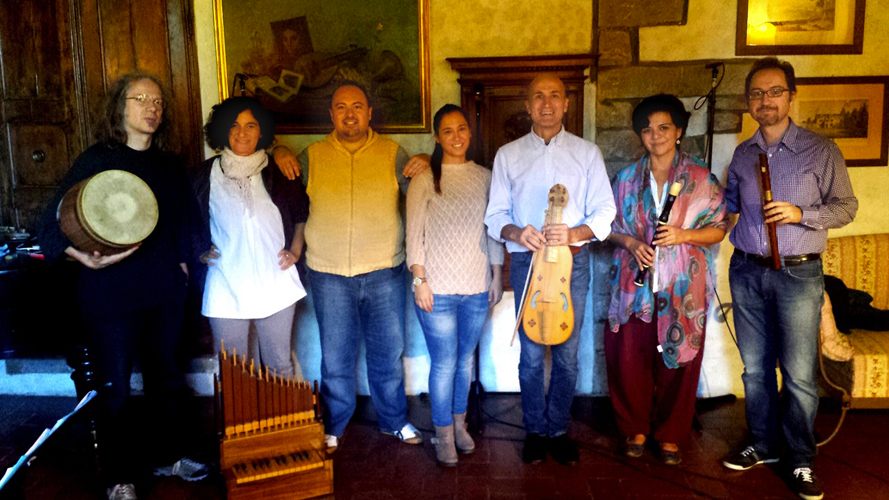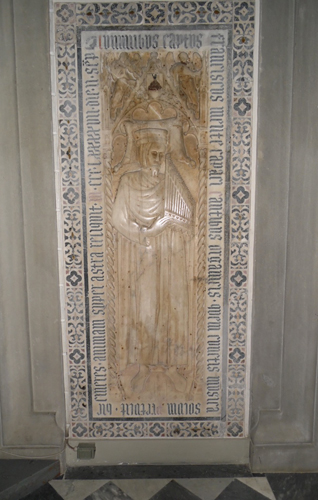

Francesco Landini Concert at Uffizi Gallery

The Concert, realized in collaboration between Ensemble San Felice and Opera Network is dedicated to the figure of Florentine Francesco Landini or Landino (1325-1397), composer, organist, poet, cantor and organ-maker. He was the greatest representative of the musical style known as Ars nova, born in France in the first half of the XIV century and thence propagated throughout central and northern Italy, especially Milan, Verona and Florence. The research of Federico Bardazzi was supported from European Union Leonardo da Vinci Program: Cantus Posterius project and realized together with University of Bergen (Norway). The concert had a great success in Italy and abroad and e Cd has been published from Bongiovanni Label
All the pieces in the program are contrafacta, that is they have a sacred text different from the original secular one. Such a technique of substitution is very old and was used from the XII century on, especially for popular melodies of easy memorization to which the composer could attach a new text. In the specific case of Landini, the fame he achieved was ample justification for such a large number of adaptations.
The manuscript containing the music is the famous Squarcialupi Codex, conserved in Florence in the Biblioteca Medicea Laurenziana. Prepared almost certainly in the monastery of Santa Maria degli Angeli between 1410 and 1415, it represents the principal source of Italian Ars nova. All the compositions (353) are secular: ballads, madrigals and hunts, and may be dated in a period going from 1340 to 1415.
Further information clicking on http://www.uffizi.it/index.php?it/340/rassegna-di-spettacoli-estivi-uffizi_live

Il concerto nella meravigliosa Galleria degli Uffizi è realizzato in collaborazione con Opera Network è dedicato alla figura del fiorentino Francesco Landini o Landino (1325-1397), compositore, organista, poeta, cantore e organaro, maestro di cappella nella Basilica di San Lorenzo dal 1365 alla morte. Fu il massimo rappresentante dello stile musicale detto Ars nova, nato in Francia nella prima metà del XIV secolo e successivamente propagatosi nell'Italia centro-settentrionale, soprattutto a Milano, Verona e nella Firenze comunale. La ricerca di Federico Bardazzi è stata sostenuta dall’Unione Europea nell’ambito del Programma Leonardo da Vinci: Progetto Cantus Posterius e realizzata con l’Università di Bergen (Norvegia). Questo concerto ha ottenuto un grande successo in Italia e all’estero ed è stato pubblicato il Cd per Bongiovanni.
Tutti i brani vocali in programma sono dei contrafacta, ossia hanno un testo sacro diverso da quello originale profano. Tale tecnica di sostituzione è molto antica e venne largamente usata a partire dal XII secolo soprattutto per melodie popolari e di facile memorizzazione, alle quali il compositore poteva sovrapporre un nuovo testo. Nel caso specifico di Landini, la fama da lui raggiunta giustifica ampiamente una mole così notevole di adattamenti.
Il manoscritto che contiene le musiche è il celebre Codice Squarcialupi, conservato a Firenze nella Biblioteca Medicea Laurenziana. Realizzato quasi certamente nel monastero di Santa Maria degli Angeli tra il 1410 e il 1415, esso rappresenta la fonte principale per l'Ars nova italiana. Tutte le composizioni (353) sono profane: ballate, madrigali e cacce, e sono databili in un arco di tempo che va dal 1340 al 1415.
Maggiori informazioni cliccando su http://www.uffizi.it/index.php?it/340/rassegna-di-spettacoli-estivi-uffizi_live
| DOWNLOAD: | ||